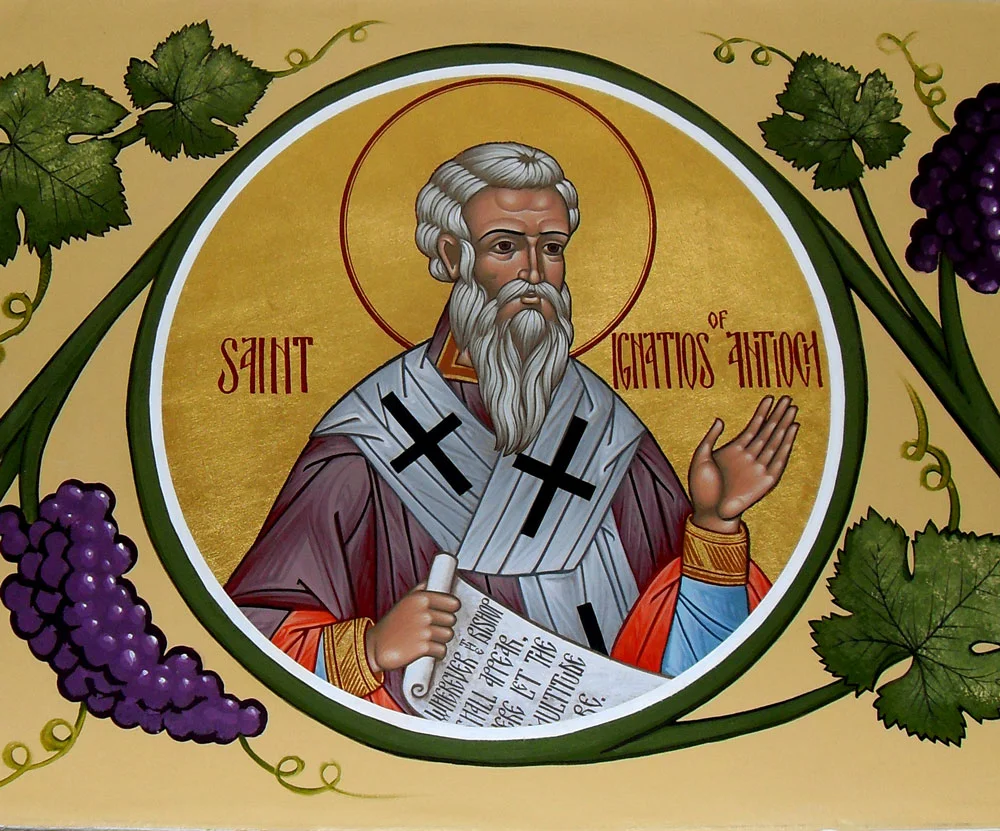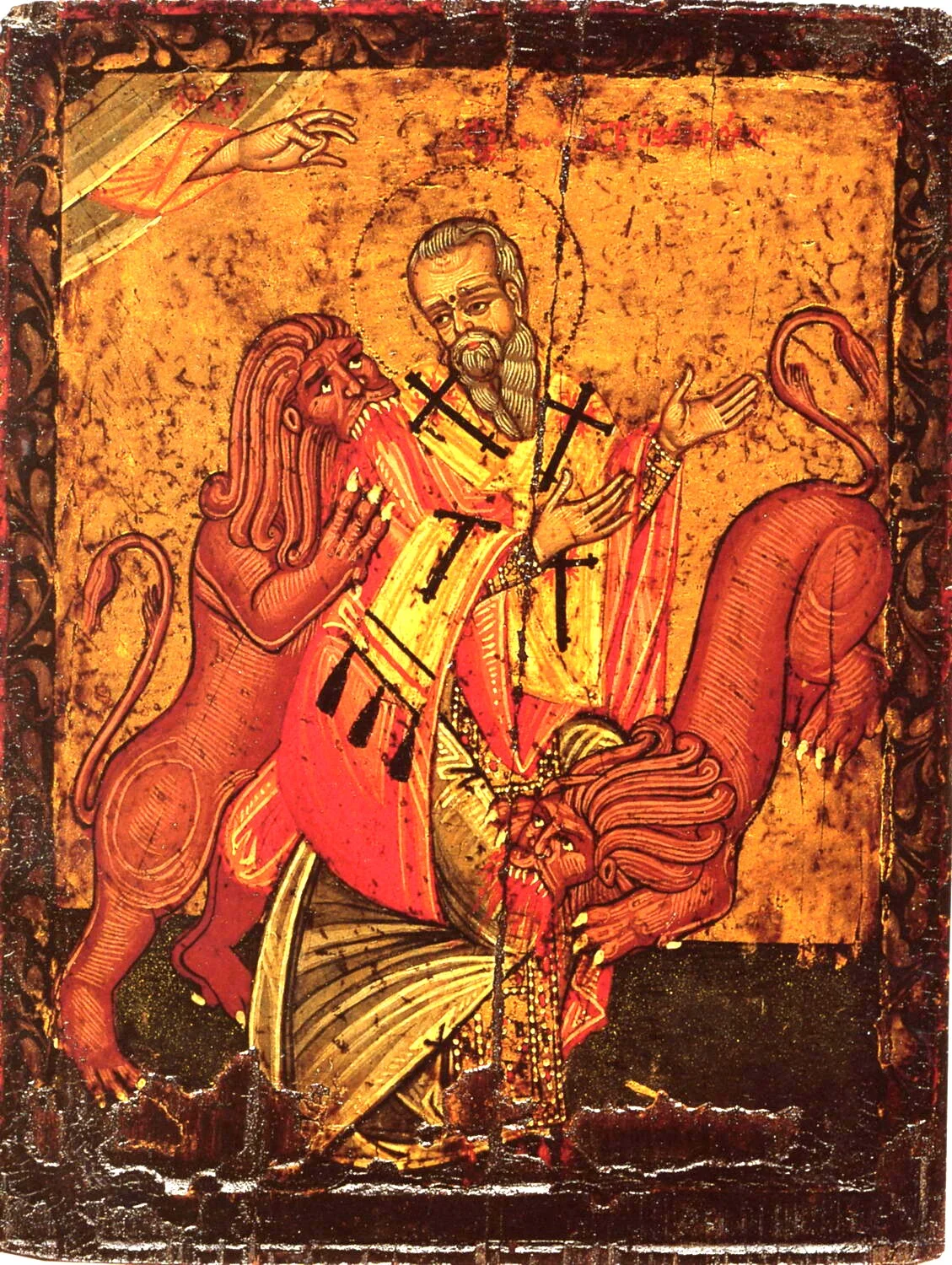Becoming Catholic #5: Church Authority, and Saint Ignatius the Red Pill, Part 2
Making Wisdom Popular
The “Becoming Catholic” blog series is a multi-part, multi-year, bite-size, fact-focused attempt at describing the journey of a lifelong protestant to the Catholic Church. You can read all the individual articles here.
Church Authority, and Saint Ignatius the Red Pill (Becoming Catholic #3, 5, 6, 8, and 10):
Part 1, Part 2, Part 3, Part 4, Part 5.
This blog post is Part 2 of Church Authority, and Saint Ignatius the Red Pill. The individual parts are linked above.
In Part 1, I covered Saint Ignatius’ ideas of church authority as articulated in his epistles to the Philadelphians and the Smyrnaeans. In Part 2, I will discuss his words on the same topic from his epistle to the Ephesians,[1] for in this one epistle to the Ephesians, we see Ignatius of Antioch articulate the basics of fundamentally Catholic ideas of hierarchical authority, Church unity, eucharistic communion, and the authority of Scripture alongside living apostolic tradition (teaching).
This post is a bit longer—I like to keep these blogs to roughly 1,000 words or less—but this epistle is jam-packed with relevant material.
As was typical for Ignatius, he begins by addressing only those in Ephesus who remain obedient to their bishop, an office Ignatius believed to have been established by Christ Himself:
I received, therefore, your whole multitude in the name of God, through Onesimus, a man of inexpressible love, and your bishop in the flesh, whom I pray you by Jesus Christ to love, and that you would all seek to be like him. And blessed be He who has granted unto you, being worthy, to obtain such an excellent bishop.
In the second chapter, he likewise salutes the other authorities in the Church, including the deacon of the Ephesian church:
As to our fellow-servant Burrhus, your deacon in regard to God and blessed in all things, I pray that he may continue blameless for the honor of the Church, and of your most blessed bishop.
His fourth chapter is particularly striking, for it makes important points about the authority, unity, and nature of the Church as Christ’s body on earth, “of whom also ye are members” (the Catholic idea of the Church as the “mystical Body of Christ” will be unpacked throughout this series—but as Ignatius shows, this idea was present in utero very early in Church history). Ignatius also quotes from Jesus’ famous “Highly Priestly Prayer” in John 17, where He prays for the unity of His Church (a chapter that has had a profound effect on many protestant converts to Catholicism, including myself):
Wherefore it is fitting that ye also should run together in accordance with the will of the bishop who by God’s appointment rules over you. Which thing ye indeed of yourselves do, being instructed by the Spirit. For your justly-renowned presbytery, being worthy of God, is fitted as exactly to the bishop as the strings are to the harp. Thus, being joined together in concord and harmonious love, of which Jesus Christ is the Captain and Guardian, do ye, man by man, become but one choir; so that, agreeing together in concord, and obtaining a perfect unity with God, ye may indeed be one in harmonious feeling with God the Father, and His beloved Son Jesus Christ our Lord. For, says He, “Grant unto them, Holy Father, that as I and Thou are one, they also may be one in us.” [John 17:23] It is therefore profitable that you, being joined together with God in an unblameable unity, should be the followers of the example of Christ, of whom also ye are members.
The fifth chapter is even more remarkable, for it again emphasizes the eucharistic aspects of the unity of the Church (including the notion of sacrifice), as well as the hierarchical:
For if I, in this brief space of time, have enjoyed such fellowship with your bishop—I mean not of a mere human, but of a spiritual nature—how much more do I reckon you happy, who so depend on him as the Church does on the Lord Jesus, and the Lord does on God and His Father, that so all things may agree in unity! Let no man deceive himself: if anyone be not within the altar, he is deprived of the bread of God. For if the prayer of one or two possesses such power that Christ stands in the midst of them, how much more will the prayer of the bishop and of the whole Church, ascending up in harmony to God, prevail for the granting of all their petitions in Christ! He, therefore, that separates himself from such, and does not meet in the society where sacrifices are offered, and with “the Church of the first-born whose names are written in heaven,” is a wolf in sheep’s clothing, while he presents a mild outward appearance.
As Ignatius continues, he again repeats claims about the hierarchy of the Church, primarily the bishops, that startled me, as a protestant—claiming they were, in some sense, directly appointed by God (as Paul does in Acts 20:28), and then using Christ’s language to refer to an actual Christian priesthood—again, a mere 75 years after Christ’s death and resurrection:
Do ye, beloved, be careful to be subject to the bishop, and the presbyters and the deacons. For he that is subject to these is obedient to Christ, who has appointed them; but he that is disobedient to these is disobedient to Christ Jesus. And “he that obeyeth not the Son shall not see life, but the wrath of God abideth on him.” [John 3:36] For he that yields not obedience to his superiors is self-confident, quarrelsome, and proud. But “God,” says [the Scripture] “resisteth the proud, but giveth grace to the humble”; [Prov. 3:34; 1 Pet. 5:5; James 4:6] and, “The proud have greatly transgressed.” The Lord also says to the priests, “He that heareth you, heareth Me; and he that heareth Me, heareth the Father that sent Me. He that despiseth you, despiseth Me; and he that despiseth Me, despiseth Him that sent Me.” [Luke 10:16] [Emphasis added]
In the sixth chapter, Ignatius against identifies obedience to Christ as obedience to His ministers, and emphasizes the essential requirement of unity, decrying the very existence of sects (i.e. denominations) within the Church. Finally, in commending the Ephesians for their proper view of the authority of their bishop, he defends this truth not by appealing to Scripture, but to what the Ephesians had been taught by Paul and Timothy themselves (Timothy was a bishop appointed by Paul). In other words, Ignatius is writing this to a church that has a living memory of an actual Apostle, and one of the bishops appointed by him:
The more, therefore, you see the bishop silent, the more do you reverence him. For we ought to receive everyone whom the Master of the house sends to be over His household, as we would do Him that sent him. It is manifest, therefore, that we should look upon the bishop even as we would look upon the Lord Himself, standing, as he does, before the Lord. For “it behooves the man who looks carefully about him, and is active in his business, to stand before kings, and not to stand before slothful men.” [Prov. 22:29] And indeed Onesimus [their Bishop] himself greatly commends your good order in God, that ye all live according to the truth, and that no sect has any dwelling-place among you. Nor indeed do ye hearken to any one rather than to Jesus Christ, the true Shepherd and Teacher. And ye are, as Paul wrote to you, “one body and one spirit, because ye have also been called in one hope of the faith.” Since also “there is one Lord, one faith, one baptism, one God and Father of all, who is over all, and through all, and in all.” [Eph. 4:4-5] Such, then, are ye, having been taught by such instructors, Paul the Christ-bearer, and Timothy the most faithful. [Emphasis added]
As Eusebius, one of the first and greatest historians of the early Church, wrote in the fourth century, referencing the bishop list of Ephesus: “Timothy, so it is recorded, was the first to receive the episcopate of the parish in Ephesus…”[2] Thus, what Ignatius says to the Ephesians in this epistle is doubly confirmed—not only with appeals to Scripture, but to this church’s living memory of their first bishop, Timothy, and the Apostle Paul who had appointed him. That Ignatius could say such things and expect his readers to both understand and agree with them was astounding to me as a protestant.
In chapter seven, Ignatius has harsh words for those who did not submit to the bishops, who he sees as the living guarantor of correct Christian doctrine:
But some most worthless persons are in the habit of carrying about the name [of Jesus Christ] in wicked guile, while yet they practice things unworthy of God, and hold opinions contrary to the doctrine of Christ, to their own destruction, and that of those who give credit to them, whom you must avoid as ye would wild beasts…
In chapter nine, Ignatius makes clear, by citing the verse about Christians being a “royal priesthood” that he sees no contradiction between the existence of a Christian hierarchical priesthood, alongside the idea that all Christians, in a sense, are “priests.” Indeed, when Peter uttered these words, he was merely repeating God’s words, via Moses, to the people of Israel (ironically, via their elders, not directly) in Exodus 19:6—and clearly Israel had a hierarchical priesthood. Ignatius writes:
Blessed, then, are ye who are God-bearers, spirit-bearers, temple-bearers, bearers of holiness, adorned in all respects with the commandments of Jesus Christ, being “a royal priesthood, a holy nation, a peculiar people,” [1 Pet. 2:9] on whose account I rejoice exceedingly, and have had the privilege, by this Epistle, of conversing with “the saints which are at Ephesus, the faithful in Christ Jesus.” [Eph. 1:1] I rejoice, therefore, over you, that ye do not give heed to vanity, and love nothing according to the flesh, but according to God.
In chapter eleven, Ignatius makes another startling claim—that the Ephesians had had “intercourse with the Apostles” not only by their association with Paul and John, but even by Timothy, and that such intercourse was due to “the power of Jesus Christ”:
May I attain to this, so that I may be found in the lot of the Christians of Ephesus, who have always had intercourse with the apostles by the power of Jesus Christ, with Paul, and John, and Timothy the most faithful.
I don’t intend to make more of this than one should. But it must certainly be relevant to the idea of Apostolic Succession (to be covered in future blogs in this series) that Ignatius includes Timothy—who was not an Apostle—among his example of “intercourse with the Apostles by the power of Jesus Christ.”
In chapter thirteen, Ignatius emphasizes that Christian unity (which he predicates on union with the bishop) is a direct object of Satanic attack, making it all the more important to maintain:
For when ye come frequently together in the same place, the powers of Satan are destroyed, and his “fiery darts” urging to sin fall back ineffectual. For your concord and harmonious faith prove his destruction, and the torment of his assistants. Nothing is better than that peace which is according to Christ, by which all war, both of aerial and terrestrial spirits, is brought to an end. “For we wrestle not against blood and flesh, but against principalities and powers, and against the rulers of the darkness of this world, against spiritual wickedness in heavenly places.” [Eph. 6:12]
Finally, in the penultimate twentieth chapter, Ignatius expresses his desire to send the Ephesians a follow-up treatise on the nature of Christ and His redemptive work. Once again, in conclusion, he emphasizes the necessity of obedience to the bishop, the presbyters, and doctrinal unity, sustained by a common partaking of the Eucharist, which Ignatius calls “the medicine of immortality”:
Especially [will I do this] if the Lord make known to me that ye come together man by man in common through grace, individually, in one faith, and in Jesus Christ, who was of the seed of David according to the flesh, being both the Son of man and the Son of God, so that ye obey the bishop and the presbytery with an undivided mind, breaking one and the same bread, which is the medicine of immortality [the Eucharist], and the antidote to prevent us from dying, but [which causes] that we should live forever in Jesus Christ.
In short, in this one epistle to the Ephesians, we see Ignatius of Antioch articulate the basics of fundamentally Catholic ideas of hierarchical authority, Church unity, eucharistic communion, and the authority of Scripture alongside living apostolic tradition—for he indeed assumes that, alongside Scripture, everything he is saying fully accords with the living memory the Ephesian church had of both the Apostle Paul, and his appointed bishop of Ephesus, Timothy.
SOURCES
[1]Ignatius of Antioch, Epistle to the Ephesians (c. 107 AD)
[2]Eusebius, Church History (Book III, Chapter 4, §6). (c. AD 320)



